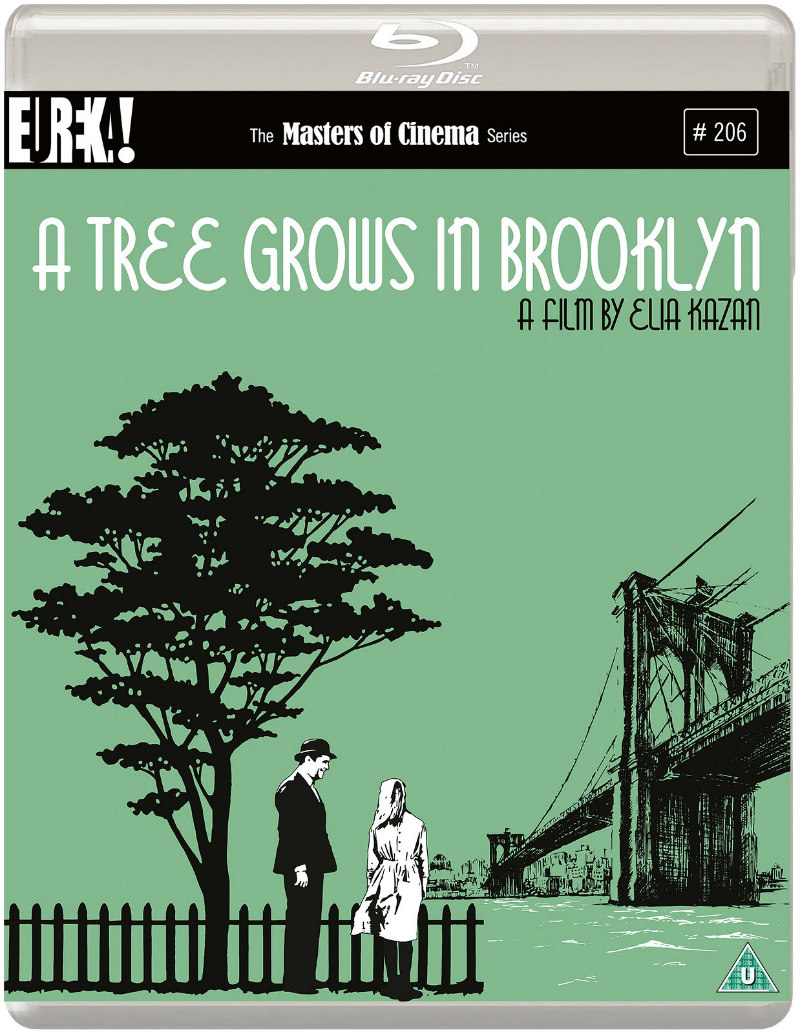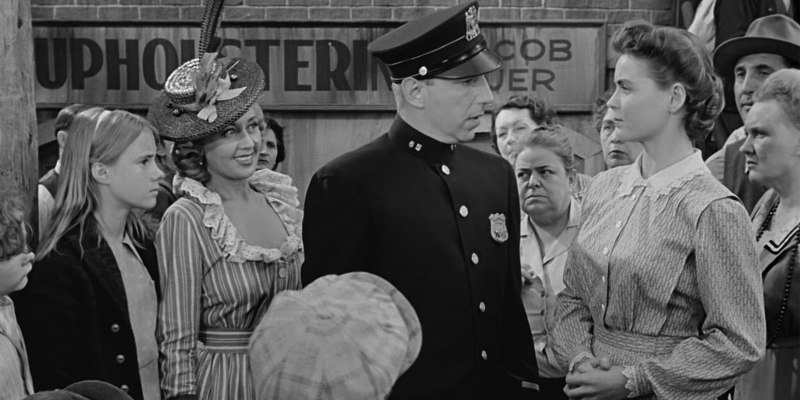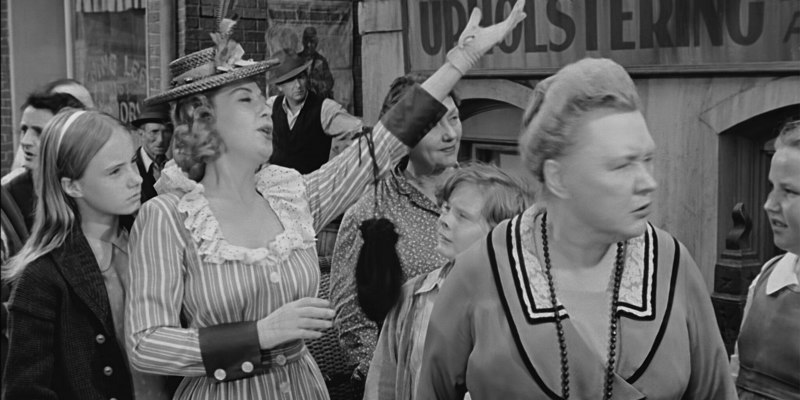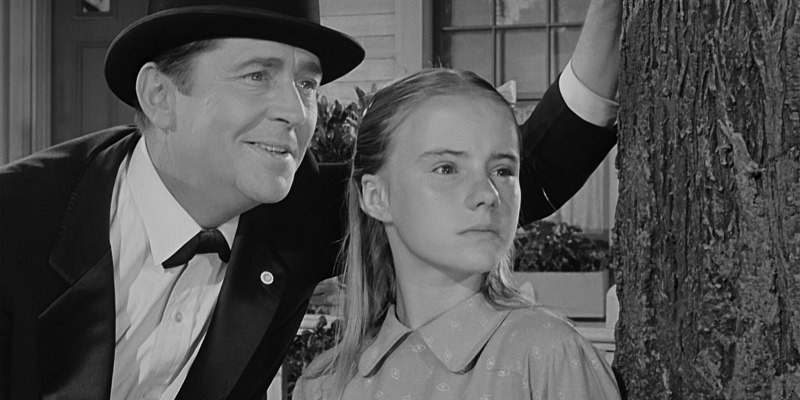
Review by Eric Hillis
Directed by: Elia Kazan
Starring: Dorothy McGuire, Joan Blondell, James Dunn, Peggy Ann Garner, Lloyd Nolan, James Gleason

At the end of WWII, Hollywood began to embrace social realism. A type of storytelling - focussed on relatable, 'everyday' men and women - that had previously been the domain of the 'women's picture' became increasingly popular among cinemagoers of both sexes. The millions of men returning to America from Europe and the Pacific had probably had enough spectacle to last the rest of their lives, and were now quite happy to watch low key family dramas centred on identifiable characters with tangible, real world hopes and concerns.
At the forefront of this new movement was Elia Kazan, a stage director who made his Hollywood debut in 1945 with an adaptation of Betty Smith's hugely successful semi-autobiographical 1943 novel A Tree Grows in Brooklyn. The eponymous New York borough may have since become a byword for gentrification, now the hipster capital of the world, but in the early 1900s it was home to over-crowded slums, housing extended immigrant families struggling with the realities of the American dream they had crossed the Atlantic in search of.

It's here that we find the Nolans, a working class Irish-American (though oddly, the grandmother speaks in an Eastern European accent) family. Johnny (James Dunn) is a happy-go-lucky troubadour with a glint in his eye who makes a paltry living performing as a singing waiter, though he has a bad habit of drinking his wages before he arrives home in a drunken heap at night. His long-suffering wife Katie (Dorothy Maguire) doesn't share her husband's contentment with his lot. She scrubs the floors of the tenement building to help pay the rent on their small apartment and dreams of something better, putting away coins in a piggy bank and keeping up the family's life insurance payments. Their 12-year-old son Neeley (Ted Donaldson) has a practical view of life, and has quickly come to grips with American capitalism, topping up his pocket money with various not so legal schemes.
The metaphorical tree of the title is 13-year-old Francie (Peggy Ann Garner). Francie shares her father's way of seeing the best of any situation, but like her mother, she also has aspirations beyond the limits of their Brooklyn borough. An aspiring writer, Francie goes along with her father's scheme to send her to a school in a middle class suburb by lying about their address. There Francie finds her talent nurtured by a sympathetic teacher, Miss McDonough (Ruth Nelson), but when Katie becomes pregnant again, requiring an extra income for the household, Francie's continuing education comes under threat.

It's easy to see why Joseph McCarthy went after Kazan in his anti-communist witch hunt, leading the director to notoriously sell out several of his colleagues. A Tree Grows in Brooklyn offers a decidedly 'un-American' view of life, proffering the idea that maybe ambition and aspirations shouldn't be the be-all and end-all of one's existence. Kazan's movie doesn't take sides with either Katie or Johnny, but it definitely leans closer to the latter's view that you should stop and appreciate the life you have now, rather than focus on some intangible distant dream being sold to you by powers that may not have your best interest at heart.
On the other hand, the film is equally sympathetic to Katie's more practical nature, which is born out of a desire to give her children the best life possible. In the past few decades we've seen an insufferable trope - usually found in the sort of comedies that star the likes of Adam Sandler - that offsets feckless, immature fathers against stern and practical mothers, portraying the latter in a villianous, cold light (it may have begun with Mrs Doubtfire). Though it was made decades before such a trope existed, A Tree Grows in Brooklyn plays like a refreshing commentary on this notion. Yes, ultimately Katie loosens her apron strings and begins to enjoy life a little more, but it's made abundantly clear that she had to make sacrifices to allow her husband to live the life of a dreamer.

Kazan is known for mining some of the most iconic performances of the 20th century from his actors, particularly from emerging talent like Marlon Brando in A Streetcar Named Desire, James Dean in East of Eden and Warren Beatty in Splendor in the Grass. Garner's performance as Francie is as good, if not better, than those of the aforementioned icons. She plays precocious without ever coming off as disingenuous, and we never feel like we're watching a child actor, rather simply a child. While shooting, Garner's father was serving in Europe, and her worries about his plight were channelled into her performance. Despicably, Kazan manipulated the child by preying on her fears regarding her father's possible fate.
Kazan claimed he was unhappy with A Tree Grows in Brooklyn, as he felt it was too stagebound, too uncinematic. I have to disagree. It may not have any showy visuals, but as much is said here in the pauses between sentences and the looks its characters give one another (or sometimes, crucially, don't) as in its florid but charming dialogue. It often resembles the work of John Ford, not just for its Irish-American milieu but in how we remember its smallest of moments rather than its overall story. It's a movie filled with little moments of human kindness, of people doing their best to get by in a tough world and keep smiling. As Joan Blondell's brassy Aunt Sissy says of her brother-in-law Johnny, "When he says hello you feel like he's giving you something." The best movies make you feel like they've given you something, and A Tree Grows in Brooklyn is abundant with human charity.

Extras:
Commentary by Richard Schickel with Elia Kazan, Ted Donaldson, and Norman Lloyd; Making Of featurette; an appreciation of Dorothy McGuire by Hollywood legend Norman Lloyd; A Tree Grows in Brooklyn – Hollywood Star Time: Original radio broadcast version of A Tree Grows in Brooklyn from 1946, starring Peggy Ann Garner, James Dunn and Joseph Kearns; booklet featuring new essays by Kat Ellinger, Phil Hoad, and Philip Kemp, alongside rare archival imagery.

A Tree Grows in Brooklyn is on blu-ray now from Eureka Entertainment.
"Coming Home stands as a testament to a time when Hollywood gave a damn."— 𝕋𝕙𝕖𝕄𝕠𝕧𝕚𝕖𝕎𝕒𝕗𝕗𝕝𝕖𝕣.𝕔𝕠𝕞 🎬 (@themoviewaffler) July 16, 2019
COMING HOME is on blu-ray now from Eureka Entertainment.
Read @hilliseric's reviewhttps://t.co/c3LqizMWuO pic.twitter.com/eYinwJJ4ts
